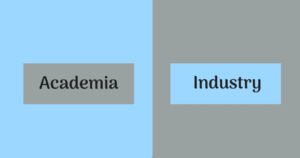
A Closer Look
When you start a PhD, you’re setting off on a big adventure. You’re going to gain extensive knowledge and become an expert in your field. But what’s next after your PhD? Most doctoral candidates think that after they finish their PhD, they’ll probably end up working at a university or a research institute. But that’s not the only option. These days, more and more people with PhDs are choosing to work in industry. That means they’re using the skills they learned during their PhD, such as statistical data analysis, to work on practical problems in companies of all types. This can be a big change, but it can also be very exciting and rewarding.
But why are people making this change? Well, there are lots of reasons. According to Ito and Kohei (1990), some researchers like the idea of working on practical problems. On the other hand, Krilić et al. (2018) stated that some early career researchers want a better balance between their work and their personal lives. While some people are attracted by the possibility of earning more money. Plus, there are a lot of PhD graduates out there, and there aren’t enough jobs in academia for all of them. So practically, many PhD graduates are finding jobs in industry instead.
But making the switch from academia to the business world isn’t always easy. You have to learn how to use the skills you learned during your PhD in a new way. But don’t worry, we’re here to help. In this post, we’ll talk about why PhD graduates are moving to the job market, what skills they bring with them, and how you can prepare for a career in industry. First, we will understand the difference between research in academia and industry. We’ll dive into self-assessment and goal setting to help you align your skills and interests with industry needs. We’ll then provide tips on crafting a strong industry-oriented CV and the importance of networking and professional development. Finally, we’ll offer strategies for navigating the job search, preparing for interviews, and successfully transitioning into your new role. So, let’s get started!
Understanding the Shift
Understanding the transition from academia to industry is crucial for PhD graduates considering this path. In academia, research is often driven by the quest for knowledge and scholarly contributions, whereas industry focuses on practical applications and market-driven solutions. The differences in work environment, job stability, and career progression between these two worlds can be significant. In this section, let’s explore these distinctions.
Differences Between Academia and Industry

Research Focus and Application
In academia, research is often driven by curiosity and the desire to expand knowledge in a specific field (Fabbe-Costes, 2022). Scholars aim to contribute to the body of knowledge and publish findings in scholarly journals. This pursuit of knowledge for its own sake is one of the hallmarks of academic research and writing. For example, a biologist in academia might spend years studying the behavior of a specific species to understand its ecological impact, with the primary goal of contributing to scientific literature.
In contrast, industry research is typically more applied, with a focus on developing products or solutions that can be brought to market. More like a statement of the problem in academics, the goal is to find a gap and create something that has a direct impact on people’s lives or the company’s bottom line. For instance, the same biologist might work for a pharmaceutical company, where the focus would be on developing a new drug based on their understanding of biological processes. As Dr. Karen Kelsky in her book “The Quick and Relatively Painless Guide to Your Academic Job Search” notes, “The primary goal of industry research is not the pursuit of knowledge for its own sake, but rather the creation of something that can be marketed and sold” (Kelsky, 2020, p.11).
Work Environment and Culture
The work environment in academia and industry can be quite different. Academia tends to offer more flexibility, allowing researchers to choose their topics through topic development programs and set their work hours. This freedom can be appealing, but it also means that a lot of time is spent working alone or in small groups, which can be isolating. An academic might spend months or even years working on a single project with minimal outside interaction.
On the other hand, the industry tends to move faster, be more structured, and team-oriented. There are set work hours, clear roles, and defined responsibilities. For example, in a tech company, a researcher might collaborate daily with statistical analysts, engineers, marketers, and product managers to bring a new product to market. The team-based environment fosters collaboration and can lead to quicker, more dynamic progress.
Job Stability and Career Progression
Academic positions, especially tenured ones, offer high job security. However, these positions are highly competitive and can be difficult to obtain. The path to tenure is long, often requiring years of postdoctoral work and a strong publication record. According to an article in Effective Altruism Forum, “Around 34% of people ending their PhDs in the US remain in academia, and of those, 12% go straight into tenure positions – without ever doing a postdoc (PabloAMC, 2020, p.3).
In contrast, industry jobs might not offer the same level of job security, but they often provide more opportunities for career progression and advancement through journal publications. Companies value the fresh perspectives and innovative thinking that PhD graduates bring, and there are many paths to move up within a company. For instance, starting as a research scientist, you might move into project management and then into a senior leadership role. The career ladder is often more transparent and achievable in industry settings.
Why Consider Industry?
 Working in industry allows you to apply your research skills to real-world problems, which can be incredibly rewarding. Seeing the direct impact of your work, whether it’s developing a new product, improving a process, or contributing to a major business decision, can be fulfilling. For example, a chemist who developed a new sustainable material might see it used in consumer products, reducing environmental impact. In a research done by Skakni (2018) on reasons, motives, and motivations for completing a PhD, a student stated that “The satisfaction of seeing my research make a tangible difference in the world was a huge draw for my PhD” (p. 203).
Working in industry allows you to apply your research skills to real-world problems, which can be incredibly rewarding. Seeing the direct impact of your work, whether it’s developing a new product, improving a process, or contributing to a major business decision, can be fulfilling. For example, a chemist who developed a new sustainable material might see it used in consumer products, reducing environmental impact. In a research done by Skakni (2018) on reasons, motives, and motivations for completing a PhD, a student stated that “The satisfaction of seeing my research make a tangible difference in the world was a huge draw for my PhD” (p. 203).
In addition to this, industry offers a wide range of career opportunities beyond the narrow focus often found in dissertation writing. You could work in research and development, data analysis, project management, consulting, and more. Furthermore, you’re not limited to one field. With a PhD, you have the skills to work in various industries, from tech to pharmaceuticals to finance. For instance, a physicist might transition to a role in finance, using their analytical skills to develop complex financial models.
Self-Assessment and Goal Setting

Transitioning from academia to industry requires more than just a change in scenery; it demands a thorough self-assessment and clear goal-setting. Understanding your unique skills, interests, and long-term career aspirations is essential to make this shift successful. Self-assessment and goal setting are your guiding tools in this transition, helping you identify what you enjoy most and where your talents can make the most impact. Let’s dive into key aspects involved in understanding your skills, setting realistic career goals, and preparing for the exciting opportunities that await in the industry.
Identify Your Skills and Interests
As a PhD graduate, you possess a unique set of skills that are highly valued in the industry. These include:
- Research and Analytical Skills: Your ability to identify a problem, develop a topic, conduct in-depth qualitative or quantitative research, analyze complex statistical or qualitative data, and draw meaningful conclusions is a valuable asset in many industry roles. For example, data analysts and market researchers rely heavily on these skills to interpret data and make informed decisions.
- Problem-Solving Skills: Your experience in tackling complex academic problems has honed your ability to think critically and creatively to find solutions. Industries such as tech and engineering highly value individuals who can approach problems with innovative thinking. According to an article published in Forbes, “more than 60 percent of employers seek evidence of problem-solving skills when evaluating candidates… and 69.6 percent of employers consider critical thinking to be a huge indicator of success on the job” (Wells, 2023, p.1)
- Project Management: Managing your PhD project from inception to completion has equipped you with skills in planning, organization, time management, and meeting deadlines. These project management skills are essential in roles such as product development, where overseeing the lifecycle of a project is crucial.
- Communication Skills: Presenting your research findings to diverse audiences during your dissertation defense has developed your ability to communicate complex ideas clearly and effectively. This is particularly important in roles that require frequent reporting, presentations, or collaboration with non-specialists, such as in consulting or client-facing positions.
Personal Interests and Long-Term Career Goals
 Understanding your interests and long-term career goals is crucial in making a successful transition to industry, therefore, you should reflect on what aspects of your PhD you enjoyed the most. For instance, if you enjoyed the statistical data analysis part of your research, you might look for roles in data science or analytics. Consider what industry sectors align with your research interests. If your research focused on renewable energy, sectors such as green technology or environmental consulting might be a good fit.
Understanding your interests and long-term career goals is crucial in making a successful transition to industry, therefore, you should reflect on what aspects of your PhD you enjoyed the most. For instance, if you enjoyed the statistical data analysis part of your research, you might look for roles in data science or analytics. Consider what industry sectors align with your research interests. If your research focused on renewable energy, sectors such as green technology or environmental consulting might be a good fit.
Think about the type of work environment that suits you best. Do you thrive in collaborative team settings, or do you prefer more independent work? Finally, envision where you see yourself in five or ten years. Think about the kind of impact you want to make and the level of responsibility you aim to have. Your answers to these questions will help guide your career decisions and ensure that you find a role that is fulfilling and aligned with your personal and professional goals.
Set Realistic Career Goals
Setting realistic career goals is an important step in your transition to industry. Start by defining your short-term objectives, which might include gaining industry experience, expanding your network, or acquiring new skills relevant to your desired industry. For example, you could aim to complete or seek coursework assistance in a certification course in project management or data science within the next six months. These short-term goals will provide immediate direction and help you build a foundation for your career.
In addition to short-term objectives, it’s essential to outline your long-term goals. These could involve reaching a specific position, working on particular types of projects, or contributing to advancements in your field. For example, you might aspire to become a lead researcher in a biotech firm or a senior consultant in an environmental agency within the next five to ten years to publish 10-15 journals annually. Having clear long-term goals helps you stay focused and motivated as you navigate your career path.
Understanding the demands of the industry you’re interested in is crucial for setting realistic career goals. Research the skills and qualifications that are in demand and identify the typical career paths in the industry. For instance, if you’re interested in the tech sector, aim for virtual and tutoring coaching to familiarize yourself with the programming languages, software tools, and methodologies that are currently popular.
Additionally, stay updated on the latest trends and future predictions in your field. This will help you anticipate changes and adapt your career goals accordingly. For example, staying informed about advancements in artificial intelligence can guide you in acquiring relevant skills and positioning yourself for future opportunities. By aligning your career goals with the realities of the industry, you can increase your chances of success and ensure a smoother transition from academia to your new career path.
Building a Strong Industry-Oriented CV

Highlighting Relevant Experience
When applying for industry roles after PhD, it is essential to tailor your CV to highlight the experience and skills most relevant to the job you’re pursuing (Chong & Clohisey, 2021). Start by showcasing any research projects that have direct relevance to the industry or role. For instance, if you’re applying for a position in pharmaceutical research, emphasize your work on drug development or related fields.
Include any internships, work experience, or collaborations with industry partners to demonstrate your familiarity with the industrial environment. Specific techniques, methodologies, or software you’ve used that are commonly utilized in the industry should also be highlighted. For example, if the job requires expertise in specific statistical data analysis, make sure your skills in softwares like SPSS or programming languages like Python are prominently featured on your CV.
Emphasizing Transferable Skills and Achievements
Your CV should also emphasize the transferable skills you’ve gained during your PhD that are valuable in industry (Chong & Clohisey, 2021). Problem-solving is a critical skill, so highlight how your research addressed complex problems, showcasing your analytical thinking and innovative solutions. Project management skills are equally important; provide examples of how you managed your research projects, met deadlines, and achieved your objectives, illustrating your ability to handle multiple tasks efficiently.
Statistical data analysis is another valuable skill—describe the types of data you’ve worked with and the analysis techniques you’ve used, demonstrating your proficiency in handling large datasets and extracting meaningful insights. Additionally, don’t forget to highlight your achievements, such as journal publications, conference presentations, awards, or successful grant applications, as these accomplishments underscore your expertise and dedication.
Showcasing Soft Skills
Soft skills are increasingly valued in the industry, and your CV should reflect your proficiency in these areas. Communication is paramount; the ability to convey complex ideas clearly and effectively is crucial. According to Chong and Clohisey (2021), when applying for a job after PhD, highlight any dissertation coaching, presentation, or public speaking experience you have, demonstrating your ability to communicate your research to diverse audiences. Teamwork is another key area that you must highlight in your CV since industry roles often involve working in teams, so provide examples of collaborative projects you’ve worked on, emphasizing your ability to contribute to and lead team efforts.
Examples of Demonstrating These Skills in Your CV
When showcasing your soft skills, provide specific examples to make your claims more compelling. For instance, under communication skills, you might state, “Presented research findings at three international conferences, receiving positive feedback for clarity and engagement.” This not only highlights your communication skills but also shows your experience and recognition in the field. For teamwork, you could write, “Collaborated with a cross-disciplinary team of five researchers to complete a complex project on time and under budget,” illustrating your ability to work effectively with others. For problem-solving, you might say, “Developed a novel analytical approach to overcome a major obstacle in my research,” showcasing your innovative thinking and determination.
Networking and Professional Development

Importance of Networking
Networking is a crucial part of transitioning to corporate America. Building a strong network of professional connections can open doors to job opportunities, provide valuable industry insights, and help you navigate your career path. Attending industry events such as conferences, trade shows, and seminars can put you in direct contact with professionals in your field. Online forums and communities, for instance, virtual tutoring and coaching, can also be beneficial, as these platforms allow you to engage with industry leaders, ask questions, and share your insights. According to Chong and Clohisey (2021), “The only way to find out what’s required in the role you are aspiring to is to find people who already do that job and ask them. Do not feel shy about introducing yourself to new people by email” (p. 3078). Therefore, don’t hesitate to reach out to people in your field of interest—most professionals are happy to share their experiences and offer advice to those entering the industry.
In addition to that, LinkedIn and other professional networking platforms are invaluable tools for building and maintaining your professional network in today’s landscape. According to a recent CareerBuilder survey, 70 percent of employers use social networking sites to research job candidates (on par with last year, the highest in 10 years), and 7 percent plan to start (CareerBuilder, 2023). If a recruitment consultant Googles your name, what will he find? Perhaps those old Facebook photos will surface to major embarrassment…but hopefully, at the top of the search results will be the photo of you receiving an achievement award from your university, or a link to your blog that showcases your interests and experience, or to your LinkedIn profile which has links to glowing testimonials from people who know him well.
These platforms also allow you to connect with industry professionals, join relevant groups, participate in discussions, and stay updated with industry news. Make sure your LinkedIn profile is up-to-date and showcases your skills, experience, and career aspirations. Join groups related to your industry, follow companies you’re interested in, and actively engage with posts and discussions. This can increase your visibility and help you establish yourself as a knowledgeable professional in your field.
Joining Professional Organizations

Joining industry-specific groups and associations can provide valuable networking opportunities, access to industry news and resources, and opportunities for professional development. These organizations often host events, webinars, and workshops that can help you stay informed about the latest trends and advancements in your field. Look for organizations that align with your field of interest and career goals, as membership can offer significant benefits such as access to exclusive job boards, professional certifications, and a community of like-minded professionals. According to Chong and Clohisey (2021):
“Joining a relevant society as a PhD student shows you are engaged with research culture and the wider research community. Societies often have conferences aimed at student researchers. Not only will your likelihood of securing a chance to present be higher at these than at bigger conferences, but it can also be easier to network with your peers, rather than those further along in their careers.” (p. 3078).
Additionally, conferences and seminars are excellent opportunities to network, learn about the latest industry trends, and gain insights into potential career paths. As you showcase your journal publications, these events bring together experts from various fields to share their knowledge and experiences, providing a rich learning environment. They can also be a great way to showcase your research and gain visibility in your field. Presenting at conferences not only enhances your profile but also demonstrates your expertise and commitment to your profession.
Conclusion
Transitioning from academia to industry after completing a PhD can be a significant yet rewarding step in your career. It’s important to recognize that while this shift might come with its challenges, it also opens doors to a variety of exciting opportunities. Industry roles offer the chance to apply your research skills to real-world problems, work in dynamic team environments, and potentially achieve a better work-life balance with higher financial rewards. You can navigate this transition smoothly by understanding the differences between academia and the business world, identifying and highlighting your transferable skills, and setting realistic career goals. Tailoring your CV to showcase relevant experience and actively networking within your desired field will further enhance your prospects.
Remember, the key to a successful transition is preparation and self-awareness. Reflect on your interests and long-term goals, engage with professional communities, and stay informed about industry trends. With determination and the right strategies, you can find a fulfilling career in an industry that leverages your PhD training and expertise. So, take the leap, explore the possibilities, and prepare yourself for an exciting new chapter in your professional life. The skills and knowledge you’ve gained during your PhD journey are invaluable assets that can drive innovation and make a tangible difference in the world.
References
70% of Employers Use Social Networking Sites to Research Candidates During Hiring Process. (2023). Retrieved July 20, 2024, from https://resources.careerbuilder.com/employer-blog/70-of-employers-use-social-networking-sites-to-research-candidates-during-hiring-process
Chong, Z.-S., & Clohisey, S. (2021). How to build a well-rounded CV and get hired after your PhD. The FEBS Journal, 288(10), 3072–3081. https://doi.org/10.1111/febs.15635
Fabbe-Costes, N. (2022). The Dynamic of Knowledge Creation in Joint Industry-Academia Research Projects: Return from Recent Action-Research Experiences in the Domain of Logistics and Supply Chain Management. In Recent Advances in Knowledge Management. IntechOpen. https://doi.org/10.5772/intechopen.101985
Ito, Y., & Kohei, S. (1990). Practical Problems in Field Research in Japan. In Cultures, Politics, and Research Programs. Routledge.
Kelsky, D. K. (n.d.). The Quick and Relatively Painless Guide to Your Academic Job Search.
Krilić, S. C., Istenič, M. Č., & Hočevar, D. K. (2018). Work–life balance among early career researchers in six European countries. Gender and Precarious Research Careers, 145, 145–177.
PabloAMC. (2020). Estimation of probabilities to get tenure track in academia: Baseline and publications during the PhD. https://forum.effectivealtruism.org/posts/3TQTec6FKcMSRBT2T/estimation-of-probabilities-to-get-tenure-track-in-academia
Skakni, I. (2018). Reasons, motives and motivations for completing a PhD: A typology of doctoral studies as a quest. Studies in Graduate and Postdoctoral Education, 9(2), 197–212. https://doi.org/10.1108/SGPE-D-18-00004
Wells, R. (2023). 60% Of Employers Prize Candidates With This In-Demand Skill In 2023. Forbes. Retrieved July 19, 2024, from https://www.forbes.com/sites/rachelwells/2023/10/04/60-of-employers-prize-candidates-with-this-in-demand-skill/